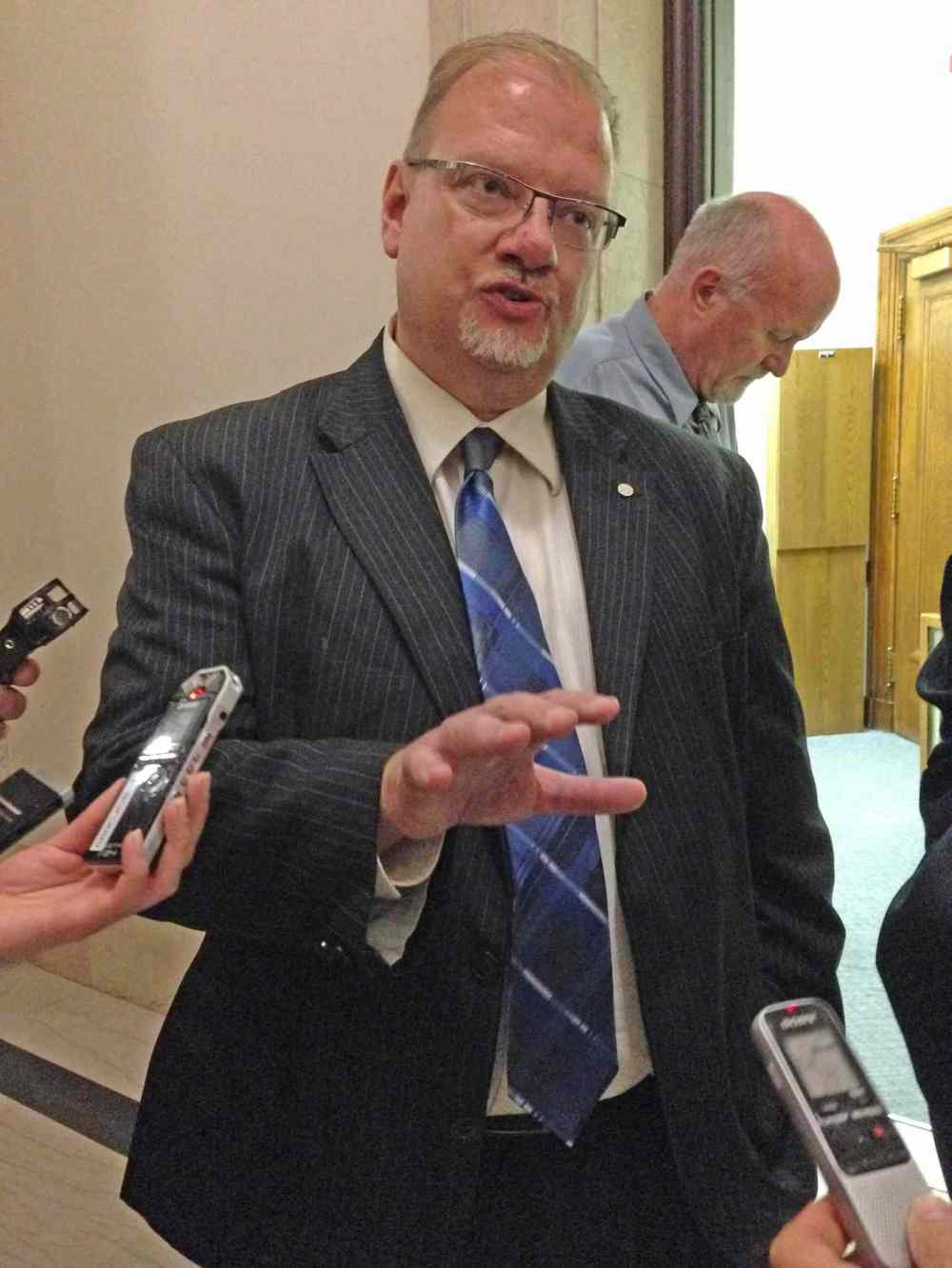Parties agree to sit longer in legislature
Advertisement
Read this article for free:
or
Already have an account? Log in here »
To continue reading, please subscribe:
Monthly Digital Subscription
$1 per week for 24 weeks*
- Enjoy unlimited reading on winnipegfreepress.com
- Read the E-Edition, our digital replica newspaper
- Access News Break, our award-winning app
- Play interactive puzzles
*Billed as $4.00 plus GST every four weeks. After 24 weeks, price increases to the regular rate of $19.00 plus GST every four weeks. Offer available to new and qualified returning subscribers only. Cancel any time.
Monthly Digital Subscription
$4.75/week*
- Enjoy unlimited reading on winnipegfreepress.com
- Read the E-Edition, our digital replica newspaper
- Access News Break, our award-winning app
- Play interactive puzzles
*Billed as $19 plus GST every four weeks. Cancel any time.
To continue reading, please subscribe:
Add Free Press access to your Brandon Sun subscription for only an additional
$1 for the first 4 weeks*
*Your next subscription payment will increase by $1.00 and you will be charged $16.99 plus GST for four weeks. After four weeks, your payment will increase to $23.99 plus GST every four weeks.
Read unlimited articles for free today:
or
Already have an account? Log in here »
Hey there, time traveller!
This article was published 11/06/2015 (3771 days ago), so information in it may no longer be current.
The 57 members of the Manitoba legislature might soon be spending a lot more time considering legislation and debating the issues of the day under a new all-party deal hammered out in the past week.
The agreement, brokered after NDP members of the legislature unwittingly agreed last Thursday to sit straight through until Dec. 31, must still be ratified by the House.
If passed by a deadline of June 30, it will represent a sea change in how the Manitoba Legislative Assembly operates.

Not only will the legislature sit each year for more than 90 days — close to 50 per cent more than it does now — but members, legislature employees, would-be political candidates and the public will know exactly when decision makers will be in the House.
Premier Greg Selinger said outside the legislature the rule changes benefit all parties, including allowing the opposition to delay votes on up to five key government bills to a later sitting.
“What we’re trying to do is strike the right balance between the ability for those who are in government to govern in the interest of the public and for the opposition to oppose in a responsible manner,” the premier said. “We think the rules that have been arrived at allow both sides to do their jobs properly and responsibly without thwarting the public interest.”
For the Opposition Progressive Conservatives, the deal fulfils a long-sought goal of increasing the number of sitting days each year as well as the desire to have a set legislative calendar.
They’ve long complained that MLAs aren’t given sufficient time to properly examine bills before they’re rammed through the legislature.
“I think it’s a win for the legislature, (for) democracy and the people of Manitoba,” said Kelvin Goertzen, the PC house leader, who played a key role in forging the deal.
Since, 2000, the Manitoba legislature has sat an average of 65 days a year — a figure that’s somewhat inflated by the 103 days members laboured in the chamber in 2013. That’s the year the Opposition creatively used the rules to stall an end to the sitting in protest of the government’s decision to increase the PST.
By comparison, the Saskatchewan legislature has sat an average of 66 days since 2000 and the Ontario legislature and average of 86 days. In more recent years, Ontario legislators have routinely sat for more than 90 days.
However, it was the prospect of being kept in the House non-stop through the end of December that sparked the agreement in Manitoba.
Last Thursday, Goertzen rose to ask leave for the House to sit in the months of July, August, September, October, November and December. When no MLA objected, Speaker Daryl Reid had no choice but to put the order into effect. MLAs always had the power to rescind the decision, but it gave Opposition MLAs more bargaining clout.
The Opposition said Thursday that the incident greatly spurred the government to act on a host of proposals for how the legislature should operate, many of which had been in the works for some time.
Not only will MLAs sit many more days each year, but they now will know well ahead of time when they’ll be in the chamber.
Under the agreement, which would take effect after next year’s election, the House will sit from the beginning of March until the first Friday in June each year, with two constituency work weeks during that time. The House will also sit from the beginning of October to the first Thursday of December, again with two weeks off during that time for constituency work.
Progressive Conservative Leader Brian Pallister said having more predictable sitting days will make it easier for all parties to recruit candidates to political life.
“It will encourage younger people with families to consider this as a career,” he said.
Pallister said when he talks to PC recruits he’s continually asked about the timing of legislative sessions. Until now, he’s had to say that he didn’t know.
Also under the deal, independent officers of the legislative assembly, such as the provincial ombudsman, auditor general, chief electoral officer and the children’s advocate, must be replaced promptly when their positions become vacant. At times, these posts have gone unfilled for years, usually with deputies serving in an acting position.
Now, a hiring committee of the legislature will have to meet within one month of the assembly receiving notice of a departure, and it must provide a recommendation on a replacement within six months.
Other proposed rule changes will affect the order and timing of House business.
As well, instead of sitting until Dec. 31 this year, members have proposed to set through until June 30, reconvene on Oct. 20 and sit until Nov. 5, reconvene once again from Nov. 16 to Dec. 3, and sit once again between Feb. 24 and March 15, 2016.
That will take MLAs to the lead-up of the April 19 general election.
larry.kusch@freepress.mb.ca
bruce.owen@freepress.mb.ca
History
Updated on Thursday, June 11, 2015 3:59 PM CDT: Selinger and Chomiak added
Updated on Thursday, June 11, 2015 6:03 PM CDT: Write-thru.


